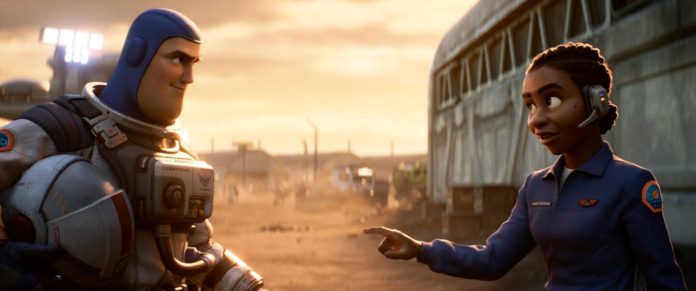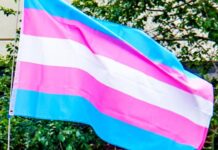
“It’s an excellent sign of the times that things are moving in the right direction, but you can’t help but feel like there’s bitter aftertaste [when] acknowledging the fact it is even worthy of discussion,” Evans says of such representation 27 years after Pixar’s first feature film, “Toy Story.” Doing so “reveals the fact that it’s long overdue, and reveals the fact that it something that is still not the norm. So there’s still a long way to go.”
The filmmakers acknowledge that it wasn’t easy to get Hawthorne’s tender moment into the final release.
“The couple as they exist — the family as they exist — was always in the film,” says “Lightyear” producer Galyn Susman. “It was just how much affection we could show.”
Disney supported the lesbian relationship, but reportedly there was pushback on the kiss — “so we had to dial it back,” Susman says. The moment would be cut.
That is until Disney, which had recently donated to Florida lawmakers, became embroiled in controversy over the state’s Parental Rights in Education law — dubbed the “Don’t Say Gay” legislation by opponents — that limits classroom discussion of gender and sexual orientation in kindergarten through third grade. Disney chief executive Bob Chapek came under fire over the company’s handling of the matter. He said Disney’s “biggest impact” comes from “creating a more inclusive world” through the company’s content.
The controversy prompted a statement from “the LGBTQIA+ employees of Pixar, and their allies,” Variety reported, that said in part that Disney executives insisted on content cuts in “nearly every moment of overtly gay affection … regardless of when there is protest from both the creative teams and executive leadership at Pixar.” Disney changed its stance.
“We were able to put it back in and we’re thrilled,” Susman says of Hawthorne’s kiss. “It’s all part and parcel of showing a wonderful relationship.”
(Disney has not yet responded to The Post’s request for comment.)
“Lightyear” director Angus MacLane knows the importance of representation. He says the relationship also helps the film’s narrative needs: How Hawthorne and Kiko build a multigenerational family heightens the sense of Buzz’s personal sacrifice. (To say anything more would be a spoiler.)
Pixar films “can’t be for everyone if we don’t have representation. Whether that be orientation or color or gender, it is important,” Susman says. “We’re reflecting the world around us and we’re making the film for ourselves and for the world around us.”
Pixar has gradually grown its LGBTQ representation the past several years. “Out,” a nine-minute short film that the studio released on Disney Plus in 2020 as part of its SparkShorts series, spotlights a gay relationship and includes the studio’s first same-sex kiss.
“Out” centers on Greg, who is trying to come out to his parents as he prepares to move from a small town with his boyfriend, Manuel. A supernatural body-swap with his pet dog leads to a crucial moment of truth.
The film — which the viewer learns is “based on a true story” — was written and directed by Steven Clay Hunter, who has also worked on “Finding Dory,” “Toy Story 4” and “Lightyear.”
Also in 2020, Pixar released “Onward,” its first feature film in which an LGBTQ character makes a reference to their identity. The film is a suburban fantasy centering on elf brothers trying to connect with their deceased dad. A purple cyclops cop named Officer Spector, voiced by Lena Waithe, makes passing mention of her girlfriend during a traffic stop.
Disney movies have a complicated history with LGBTQ representation, including blink-and-you’ll-miss-it moments and some hyped misfires.
Recent Disney live-action feature films that have had a same-sex kiss include last year’s “Eternals,” directed by Chloé Zhao. The intimate moment is between Phastos (Brian Tyree Henry) — the Marvel Cinematic Universe’s first openly gay superhero on the big screen — and husband Ben (Haaz Sleiman). And in 2019, the Star Wars live-action screen franchise showed its first on-camera same-sex kiss, between not any of its leads, but rather Commander Larma D’Acy (Amanda Lawrence) and her X-Wing pilot girlfriend, in “Star Wars: The Rise of Skywalker.”
Also worth noting: A director on the Disney Plus series “Loki” confirmed that Tom Hiddleston’s title character is bisexual — reportedly a first among characters who appear in the MCU.
Some Disney Animation films, such as 2016′s “Zootopia,” have offered characters whom some viewers have interpreted as being in same-sex relationships.
Then there was the 2017 live-action remake of “Beauty and the Beast.” Director Bill Condon promised a “nice, exclusively gay moment” involving Gaston’s sidekick, LeFou (Josh Gad); there are hints about his sexuality sprinkled across the movie before he dances with a man at film’s end. This year, Gad said the film “didn’t go far enough to warrant accolades,” adding: “It was never intended to be a moment that we should laud ourselves for, because frankly, I don’t think we did justice to what a real gay character in a Disney film should be.”
This week, entertainment outlets reported that “Lightyear” will not screen in such markets as Saudi Arabia, Kuwait, Malaysia and Indonesia, because of its same-sex kiss. Disney’s “Eternals,” “West Side Story” and “Doctor Strange in the Multiverse of Madness” did not screen in the Gulf region because of “scenes involving LGBTQ references or topics, which often fall foul of censors for theatrical releases due to homosexuality being officially illegal across the region,” the Hollywood Reporter wrote.
Given Disney’s trends, more LGBTQ representation could be right on the horizon.
In 2017, Tessa Thompson told Rolling Stone that Valkyrie, her Asgardian character in Disney/Marvel’s “Thor: Ragnarok,” had a scene cut that would have confirmed Valkyrie’s bisexuality. Thompson returns to the franchise next month, in “Thor: Love and Thunder,” and some industry observers think this might be her moment to find love.








